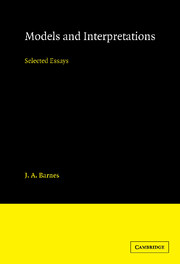Book contents
- Frontmatter
- Contents
- Preface
- Acknowledgments
- Introduction: social science in practice
- I MODELS OF THE REAL SOCIAL WORLD
- II MODELS OF SOCIAL SCIENCE
- 8 Feedback and real time in social inquiry (1967b)
- 9 Time flies like an arrow (1971f)
- 10 Kinship studies: some impressions of the current state of play (1980c)
- 11 Sociology in Cambridge: an inaugural lecture (1970m)
- 12 Social science in India: colonial import, indigenous product or universal truth? (1982c)
- III A MODEL OF MODELLING
- Postscript: structural amnesia (1947: 52–3)
- Bibliography
- Index
8 - Feedback and real time in social inquiry (1967b)
Published online by Cambridge University Press: 08 January 2010
- Frontmatter
- Contents
- Preface
- Acknowledgments
- Introduction: social science in practice
- I MODELS OF THE REAL SOCIAL WORLD
- II MODELS OF SOCIAL SCIENCE
- 8 Feedback and real time in social inquiry (1967b)
- 9 Time flies like an arrow (1971f)
- 10 Kinship studies: some impressions of the current state of play (1980c)
- 11 Sociology in Cambridge: an inaugural lecture (1970m)
- 12 Social science in India: colonial import, indigenous product or universal truth? (1982c)
- III A MODEL OF MODELLING
- Postscript: structural amnesia (1947: 52–3)
- Bibliography
- Index
Summary
The chapters in the first part of this book are focused on various features of the world – relations of kinship, lineage, social class, political party, and of conqueror and conquered – all of which are to be encountered mainly away from libraries and university campuses. In the second part we turn to examine an activity that typically is pursued on the campus, the study of social science. Relations of kinship and the like are of course to be found on university campuses, and likewise the university does not have a monopoly of the study or practice of social science. Nevertheless, there is a valid contrast between the largely non-intellectual content of the relations which are dealt with by the models discussed in the first part and the mainly intellectual activities considered in the chapters of the second part.
A common theme runs through the second part, the contrast between what I call the natural science paradigm (cf. Barnes 1980a: 25–35), an idealized model of the procedures of inquiry and analysis typically followed in the natural sciences, and the modes of inquiry and analysis appropriate to the social sciences. This contrast has a long history, notably including the Geisteswissenschaft controversy during the latter half of the nineteenth century, a history that I largely ignore. The essays presented here were all written in response to problems I encountered in my own work, problems that arose because of my wish to apply, as far as possible, the methods of the natural sciences to the study of social institutions and relations. I was trained initially as a mathematician and later found myself working in a wartime radar research establishment. […]
- Type
- Chapter
- Information
- Models and InterpretationsSelected Essays, pp. 133 - 149Publisher: Cambridge University PressPrint publication year: 1990



